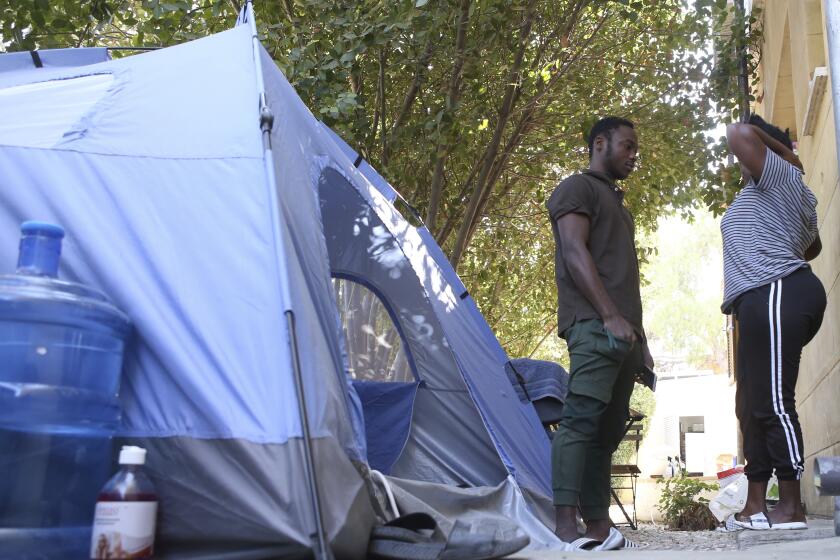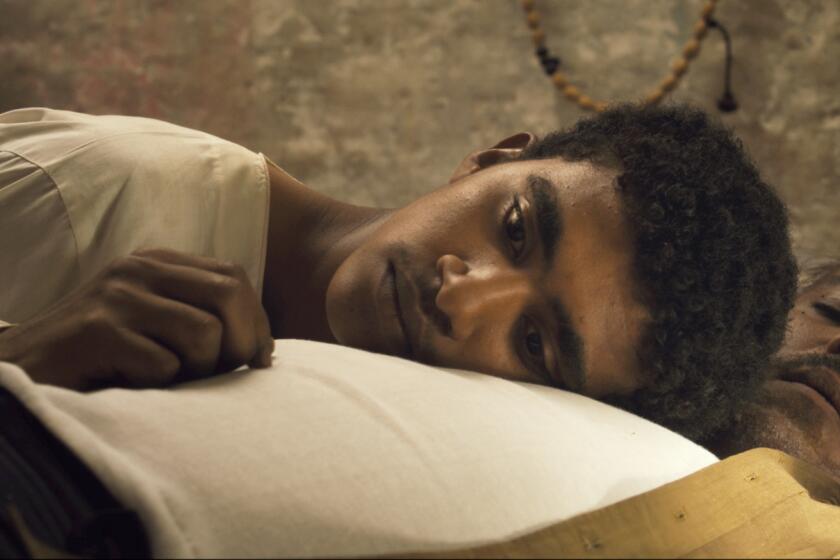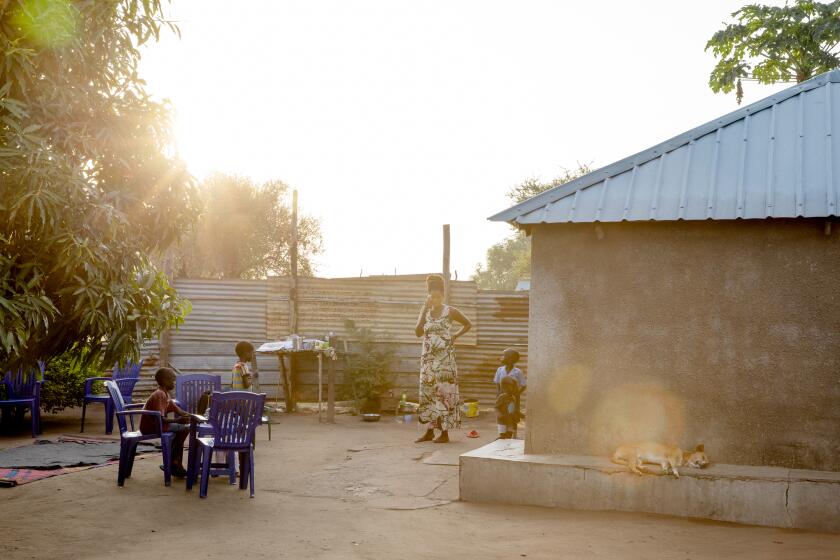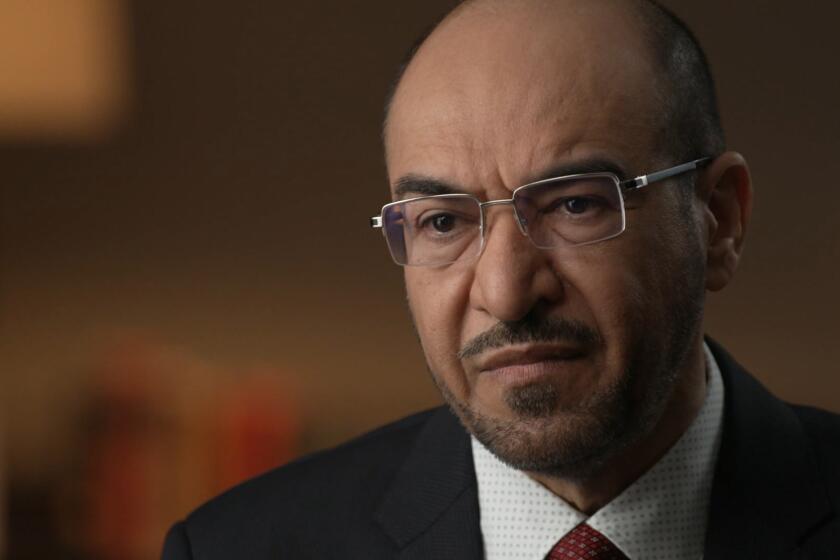Military takes over, prime minister is arrested in Sudan coup
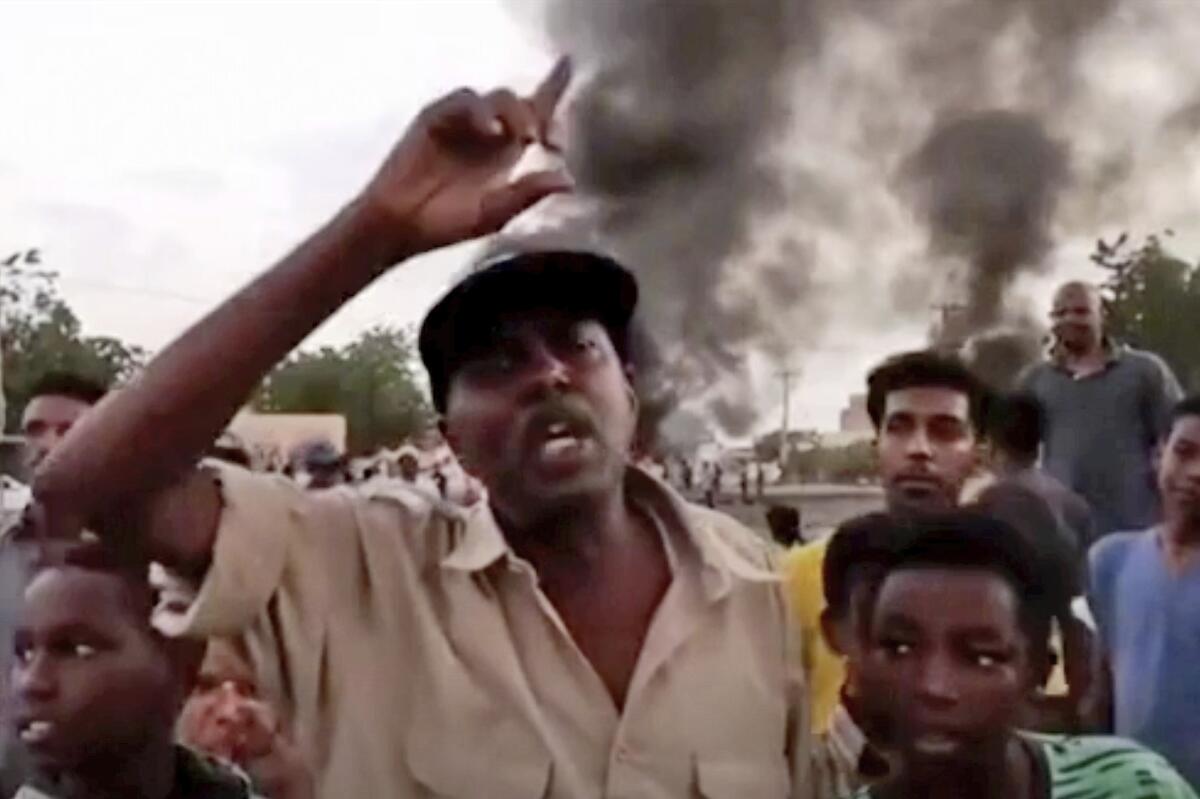
- Share via
CAIRO — Sudan’s military seized power Monday, dissolving the transitional government hours after troops arrested the prime minister. Thousands of people flooded into the streets to protest the coup that threatens the country’s shaky progress toward democracy.
Security forces opened fire on some of the crowds, and three protesters were killed, according to the Sudan Doctors’ Committee, which said 80 people were wounded.
The takeover, which drew condemnation from the United Nations, the United States and the European Union, comes more than two years after protesters forced the ouster of longtime ruler Omar Bashir, and just weeks before the military was supposed to hand over he leadership of the council that runs the country to civilians.
After the early morning arrests of Prime Minister Abdalla Hamdok and other senior officials, thousands poured into the streets of the capital, Khartoum, and its twin city of Omdurman. They blocked streets and set fire to tires as security forces used tear gas to disperse them.
As plumes of smoke rose, protesters could be heard chanting, “The people are stronger, stronger!” and “Retreat is not an option!” Videos on social media showed crowds crossing bridges over the Nile to the center of the capital. The U.S. Embassy warned that troops were blocking parts of the city and urged the military “to immediately cease violence.”
Pro-democracy activist Dura Gambo said paramilitary forces chased protesters through some Khartoum neighborhoods.
Records from a Khartoum hospital obtained by the Associated Press showed some people admitted with gunshot wounds.
The head of the military, Gen. Abdel-Fattah Burhan, announced on national TV that he was dissolving the government and the Sovereign Council, a joint military and civilian body created soon after Bashir’s ouster to run the country.
Enjei Grace and fellow Cameroonian Daniel Ejube have been stuck in limbo, in the buffer zone separating Cyprus’ north from the south.
Burhan said quarrels among political factions had prompted the military to intervene. Tensions have been rising for weeks over the course and the pace of the transition to democracy in Sudan, a nation in Africa linked by language and culture to the Arab world.
The general declared a state of emergency and said the military will appoint a technocratic government to lead the country to elections, set for July 2023. But he made clear the military would remain in charge.
“The armed forces will continue completing the democratic transition until the handover of the country’s leadership to a civilian, elected government,” Burhan said. He added that the country’s constitution would be rewritten and a legislative body would be formed with the participation of “young men and women who made this revolution.”
The Information Ministry, still loyal to the dissolved government, called his speech an “announcement of a seizure of power by military coup.”
For the first time in its history, Sudan has a submission for the Academy Awards
As darkness fell in Khartoum, barricades were still burning and occasional gunshots could be heard, said Volker Perthes, the United Nations special envoy for Sudan, at a briefing in New York.
White House spokesperson Karine Jean-Pierre said the U.S. was “deeply alarmed at reports of a military takeover” and called for the immediate release of the prime minister and other officials.
“The actions today are in stark opposition to the will of the Sudanese people and their aspirations for peace, liberty and justice,” Jean-Pierre said.
The Biden administration is suspending the provision of $700 million in emergency economic aid to Sudan that had been allocated to help the transition, said State Department spokesman Ned Price. He called it a “pause,” and urged the civilian-led government to be immediately restored.
U.N. Secretary-General Antonio Guterres “strongly condemns the ongoing military coup d’état in Khartoum and all actions that could jeopardize Sudan’s political transition and stability,” said his spokesman, Stéphane Dujarric.
Guterres also called for the release of the government officials, the spokesman said, as did the African Union. EU foreign affairs chief Joseph Borrell tweeted that he was following the events with the “utmost concern.”
Michelle Bachelet, the U.N. high commissioner for human rights, warned that Sudan could slip backward, urging the military to release the officials, withdraw from the streets and settle differences with civilians in the transitional government “through dialogue and negotiation.”
Since Bashir, who remains in prison, was forced from power, Sudan has worked to slowly rid itself of the international pariah status it held under the autocrat. The country was removed from the United States’ state supporter of terror list in 2020, opening the door for badly needed foreign loans and investment.
But Sudan’s economy has struggled with the shock of a number of economic reforms called for by international lending institutions. U.S. Sen. Chris Coons (D-Del.), a member of the Foreign Relations Committee and a close ally of President Biden, warned in a tweet that the U.S. could cut aid to Sudan “if the authority of PM Hamdok & the full transitional government is not restored.”
Even before the pandemic hit, South Sudanese women were accustomed to building lives on the edge of uncertainty.
In recent weeks, there had been concerns that the military might be planning a takeover, and in fact there was a failed coup attempt in September. Tensions only rose from there as the country fractured along old lines, pitting more conservative Islamists who want a military government against those who toppled Bashir in protests. In recent days, both camps have taken to the street in demonstrations.
Amid the standoff, the generals have called repeatedly for dissolving Hamdok’s transitional government — and Burhan, who leads the ruling Sovereign Council, said frequently that the military would only relinquish power to an elected government, an indication that the generals might not stick to the plan to hand leadership of the body to a civilian sometime in November. The council is the ultimate decision-maker, though the Hamdok government is tasked with running Sudan’s day-to-day affairs.
Breaking News
Get breaking news, investigations, analysis and more signature journalism from the Los Angeles Times in your inbox.
You may occasionally receive promotional content from the Los Angeles Times.
As part of efforts to resolve the crisis, Jeffrey Feltman, the U.S. special envoy to the Horn of Africa, met with Sudanese officials over the weekend, and senior Sudanese military officials said he tried unsuccessfully during his visit to get the generals to stick to the agreed plan.
The arrests began a few hours later, said the official, who spoke on condition of anonymity because he was not authorized to brief media. The official said the prime minister and the others were being detained in a military camp outside Khartoum.
The military has been emboldened recently in its dispute with civilian leaders by the support of tribal protesters, who blocked the country’s main Red Sea port for weeks. The two most senior military officials, Burhan and his deputy, Gen. Mohammed Hamdan Dagalo, also have close ties with Egypt and the wealthy Gulf nations of Saudi Arabia and the United Arab Emirates.
Africa’s rare glaciers, such as the one on Mt. Kilimanjaro, will disappear in the next two decades because of climate change, a new report warns.
The first reports of a possible military takeover emerged before dawn, and the Information Ministry later confirmed them hours later, saying Hamdok and several senior government figures had been arrested and their whereabouts were unknown. Internet access was widely disrupted and the country’s state news channel played patriotic traditional music.
Hamdok’s office denounced the detentions on Facebook as a “complete coup.” It said his wife was also arrested.
Sudan has suffered other coups since it gained its independence from Britain and Egypt in 1956. Bashir came to power in 1989 in one such takeover, which removed the country’s last elected government.
Crown Prince Mohammed bin Salman, Saudi Arabia’s de facto ruler, once spoke of killing his father’s predecessor as king, an ex-security official says.
Among those detained Monday were senior government figures and political leaders, including the information and industry ministers, a media advisor to Hamdok and the governor of the state that includes the capital, according to the senior military official and another official. Both spoke on condition of anonymity because they were not authorized to share the information with the media.
After news of the arrests spread, the country’s main pro-democracy group and two political parties issued appeals to the Sudanese to take to the streets.
The Communist Party called on workers to protest what it described as a “full military coup” orchestrated by Burhan.
Associated Press writer Edith M. Lederer at the United Nations contributed.
More to Read
Sign up for Essential California
The most important California stories and recommendations in your inbox every morning.
You may occasionally receive promotional content from the Los Angeles Times.
